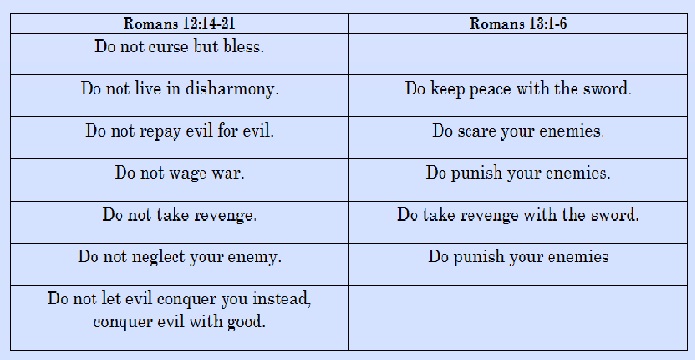by Greg Boyd
First, both Jesus and his Jewish audience were very familiar with the OT’s commands to take “an eye for an eye and a tooth for a tooth” (Ex 21:24; Lev 24:19-20; Deut 19:21). In this light, I find it hard to imagine how Jesus could refer to the “eye for an eye” sayings that his audience had “heard” and not think his audience would assume he’s referring to these OT commands. This would be a bit like me saying to an American audience, “You’ve heard it said, ‘We hold these truths to be self-evident’” while assuming this audience would naturally think I’m referring to something other than our Constitution!
Second, while the NT certainly distinguishes between the way God uses governments and the way believers are called to live (Rom 12 and 13), I see no warrant for appealing to this distinction as a means of avoiding the conclusion that Jesus was repudiating the OT’s “eye for an eye” commands. Indeed, each of these commands in the OT is given in contexts that address interpersonal conflicts.
Jesus is addressing the way his followers should respond to personal offenders and enemies, but I see no way of avoiding the conclusion that the way Jesus instructs followers to respond to these personal offenders and enemies flatly repudiates the response that is prescribed in the OT.
And third, I think that it’s incorrect to contend that the distinction between the way God uses sword-wielding governments and the way believers are called to live is a distinction between what’s appropriate at a personal level and what’s appropriate for “a public office.” This reflects the classic Lutheran view that Christians are commanded to love and bless enemies on a personal level but are allowed to kill their enemies when serving in public office.
I submit that the distinction Paul makes in Romans 12 and 13 is not between behavior that’s appropriate for Christians at a personal level and behavior that’s appropriate for Christians when serving in “a public office.” The distinction is rather between the way followers of Jesus are to always respond to offenders and enemies, on the one hand, and the way God influences governments to respond to offenders and enemies, on the other.
In Romans 12 Paul tells disciples to (among other things) “bless those who persecute you”( vs. 14); “do not repay anyone evil for evil” (vs. 17); and especially “never avenge yourselves, but leave room for the wrath of God; for it is written, ‘Vengeance is mine, I will repay, says the Lord’” (vs. 19). Leaving vengeance to God, followers of Jesus are to instead feed our enemies when they are hungry and give them water when they are thirsty (vs. 20). Instead of being “overcome by evil,” we are to “overcome evil with good” (vs. 21).
Notice that Paul does not qualify any of these instructions. There is not the slightest hint that there may be some contexts in which it would be okay for followers of Jesus to not “bless those who persecute us” or not leave vengeance to God. As is true of Jesus’ teaching about loving enemies, Paul’s instructions indicate that Christians are to refrain from violence and to instead love and bless all enemies all the time and in all situations.
Paul then immediately goes on to specify that sword-wielding authorities are one of the instruments God uses to execute vengeance (13:4). This is the very same vengeance disciples were just forbidden to exercise (12:19, ekdikeo). Paul is thus not suggesting that Christians should exact vengeance on a personal level but may do so when serving in a “public office,” as Copan contends. He is rather teaching that Christians can’t ever exact vengeance, which implies that, while we can trust that God is at work to use sword-wielding governments to exact vengeance, we who are committed to following Jesus are not to participate in that sword-wielding activity.
The claim that Jesus’ and Paul’s teaching about loving enemies and refraining from violence only apply to Christians in their personal relationships but do not apply if the Christian is serving in a public office was a foundational feature of Christendom. It was this clever theological move that allowed professing Christians to engage in whatever bloodshed the empire deemed necessary.
The life and role of kingdom people should not be something we assume sometimes and not others. It is a reality we are called to live in at every moment and in every situation.




